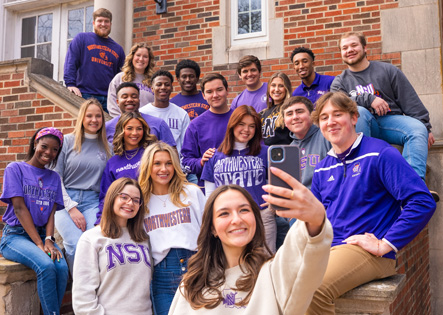Satisfactory Academic Progress (SAP)
The Federal Government mandates that students must maintain satisfactory academic progress toward completion of their degrees within a reasonable period of time in order to be eligible for Title IV financial aid programs (includes grants, work-study, Direct Student Loans, PLUS, and Perkins loans).
SAP Requirements
- Passing a required number of hours (67% of all hours attempted)
- Achieving a required cumulative GPA (2.0 for undergraduates; 3.0 for graduates)
- Not exceeding attempted hours (150% of the published length of the student’s degree program)
All students’ academic progress will be reviewed at the end of each semester. Students whose status has changed to Warning or Failed will be emailed at their official NSU email address.
SAP Status Categories
- Good Standing: Student has met progress standards and is eligible for aid for the following semester.
- Warning: Student has not met progress standards but remains eligible for financial aid; the student must make progress by the end of the warning semester.
- Failed Standards: Student has not made progress after the warning period and is no longer eligible for financial aid (see Re-establishing Eligibility).
- Probation: Student has not met progress standards but has an approved appeal and is eligible for financial aid for one semester.
Transfer Students
Transfer students must meet NSU’s minimum academic standards to receive Federal Financial Aid at Northwestern State University and must supply the NSU Admissions Office with transcripts from all previous institutions attended.
Second Degree Students
Students are allowed additional attempted hours to complete additional degree programs:
- 2nd BS – 90 additional hours
- 2nd Associate – 45 additional hours
- 2nd Master’s – 15 additional hours
- Certification beyond BS or Master’s – 45 additional hours
- Associate beyond bachelor’s – 45 additional hours
- Specialist beyond Master’s – 45 additional hours
Example
If a student attempts to earn multiple degrees of the same level, the additional hours are not increased twice. Example: A student receives a first bachelor’s at 185 hours. The student is given 90 more hours to pursue additional bachelor’s degrees for a total of 275 hours. Once 275 hours are attempted, the student is no longer eligible for federal aid, regardless of pursuing a second or third bachelor’s.
Re-establishing Financial Aid Eligibility
Students who do not meet SAP standards have two options to receive financial aid in future semesters: attend and regain without the benefit of financial aid, or appeal. You must be enrolled and attending to re-establish eligibility. Sitting out a semester does not exempt you from the conditions below when you re-enroll.
Attend and Regain Without the Benefit of Financial Aid
Students may attend at their own expense and must earn a cumulative 67% of hours attempted and achieve a 2.0 cumulative GPA for undergraduates or 3.0 for graduates.
Note
Students who are over their attempted hours cannot regain eligibility on their own.
Appeal
Students may appeal to the Student Financial Aid Appeals Committee. The student must be able to meet progress requirements by the end of the semester in which the student is appealing (2.0 cumulative GPA for undergraduates; 3.0 for graduates; pass 67% of cumulative courses attempted; and not exceed 150% of the degree program). Use the calculator below to determine if you are eligible to appeal.
Student Financial Aid Appeal
Students who do not meet SAP standards may appeal based on extenuating circumstances (e.g., prolonged illness; accidents requiring hospitalization to the student or a close family member; death of an immediate family member; other significant incidents). All appeals should include documentation corresponding to the type of appeal.
Appeals submitted after the priority deadline will not receive priority consideration; students should make payment arrangements with the Cashier’s Office for fees incurred from registration.
Appeals must include the following:
- Why the student failed to make satisfactory academic progress
- What extenuating circumstances existed and documentation of the situation
- What has changed that will allow the student to demonstrate progress at the next evaluation
If the appeal is approved, the student is eligible for aid during the next semester; progress will be rechecked at the end of that semester. There is no limit to the number of appeals during an academic career. If an appeal for a given semester is denied, the student may appeal one additional time for that semester only if new and updated information/documentation is provided.
Appeal Deadlines
-
Fall Appeals
- Priority deadline: July 15
- Final deadline: September 30
-
Spring Appeals
- Priority deadline: January 2
- Final deadline: February 28
-
Summer Appeals
- Priority deadline: June 6
- Final deadline: July 15
Committee Review Considerations
- Reason(s) the student did not make progress (grades or hours)
- Quality and relevance of supporting documentation
- Number of prior appeals
- Attempted hours, earned hours, and GPA for the past 3 semesters
- Transcripts from other universities (for transfer students)
- Student’s statement explaining why progress was not made and what has changed to enable current progress
Academic Plan
Beginning Fall 2015
Due to the opening of the Academic Success Center (ASC), Academic Plans are available to students who are not making academic progress and cannot regain eligibility within one semester. Students complete a Financial Aid appeal form with required documentation. The Office of Student Financial Aid (OSFA) will determine whether the appeal is reviewed through the FA appeal process or submitted to ASC for an Academic Plan.
If approved by ASC, Academic Plans are tailored to the student’s needs (GPA, hours attempted/earned, plan length) to enable progress within a determined timeframe while still receiving federal financial aid. ASC will review plan requirements with the student, who must sign a contract acknowledging understanding and agreement. ASC will monitor progress. Students not meeting plan requirements at term end are ineligible for Title IV aid until they regain eligibility on their own. Only extenuating circumstances beyond the student’s control (e.g., illness, death, military) may warrant review for a second attempt or changes to an existing plan.
Repeat Coursework
You may include any repetition of a course in a student’s enrollment status for a term as long as the student has never passed the course. After a student passes the course, one additional repetition may be included. Any second or subsequent repetition of a passed course may not be included for Title IV purposes.
Book Vouchers
Spring 2026 book vouchers are available starting January 7th, 2026 and will expire on January 21, 2026. Please ensure all books are purchased or ordered by the due date. Book vouchers cannot be extended.
Book Voucher Eligibility and Use
Who is eligible for a book voucher?
Students receiving financial aid in excess of their account balance. To determine if you have a credit balance:
- Go to myNSU
- Enter your Login ID and Password
- Select Financial Aid
- Select “How much is my Book Voucher”
- Select “Term”
How much can I receive?
Up to $1,000, depending on your credit balance. You are charged only for actual purchases. Note: Student-athletes whose athletic scholarship covers books should contact the Compliance Office.
How do I use my book voucher?
Present your NSU One Card (student ID) at a participating bookstore or order online via the bookstore website using the option to charge books to your account.
Additional Notes
- If a book is not in stock, you may use the voucher to pre-pay.
- After expiration, future purchases must be made using personal funds.
- You may buy from any participating bookstore.
After using the voucher
Charges will appear on your student account. Any funds received by NSU will pay current semester charges, including book charges. For questions about book charges, contact the bookstore where you purchased.
Unusual Enrollment History (UEH)
Beginning in 2013–2014, some FAFSAs are flagged for “unusual enrollment history” due to receipt of Pell Grants and/or Federal Direct Loans at multiple institutions in recent years. Flags “2” and “3” require the current institution to review enrollment history to determine whether the student is enrolling only long enough to receive cash refunds of federal student aid.
NSU will check the National Student Loan Data System (NSLDS) for complete enrollment history (schools attended over the last 4 academic years and dates of attendance).
How to resolve
All students with UEH flag 3 and some with flag 2 must provide academic transcripts or grade reports from all colleges and universities attended during the review period. If Pell Grants and/or Direct Loans were received and passing credit hours were not earned for those award years, the student may be determined ineligible for further federal aid. The Financial Aid Office may require official transcripts if submitted documents are unclear.
Appealing an ineligibility determination
Students determined ineligible may appeal by contacting the Financial Aid Office.
Regaining eligibility
Students can be reconsidered after enrolling for two academic terms, not dropping or withdrawing from any courses after the term begins, and meeting Satisfactory Academic Progress standards.
Refunds
All student aid funds (except Federal Work-Study and Student Employment Scholarship) disbursed to a student’s account will first be applied to amounts owed to NSU. If aid exceeds the amount owed, a refund check or direct deposit will be issued.
- Grants, institutional scholarships, and loans are applied as funds arrive after the add/drop period. Federal regulations state:
- For first-year undergraduates who are first-time Stafford borrowers, the first installment may not be disbursed until 30 days after classes begin.
- A single-semester loan must be disbursed in two installments (first half at the beginning of the semester; second half at midpoint).
- TOPS and Go Grant are applied when payment is received and disbursed about 45 days after classes start.
- Third-party scholarships are applied after payment is received from a billed invoice.
Code of Conduct
- Standardizes best practices for providing educational loans and consolidations to students and parents.
- University employees will not accept anything from lenders/guarantors/servicers doing business with or anticipating doing business with the university other than items of nominal value or food/beverages consumed in the presence of the lender/guarantor/servicer.
- University employees are prohibited from receiving anything of value, including trips, for serving on a loan institution advisory board.
- NSU will not receive financial benefits in exchange for giving lenders, guarantors, or servicers a competitive advantage or preferential treatment, and will not accept financial benefits for being placed on a lender list.
- All financial aid personnel will comply with NASFAA’s Statement of Ethical Principles and Code of Conduct for Institutional Financial Aid Professionals: https://www.nasfaa.org/Code_of_Conduct
Overawards
Federal and/or State Financial Aid recipients may not receive funds in excess of financial need and/or cost of attendance. When an overaward occurs, the Department of Student Financial Aid must adjust aid; the student may be required to repay funds due to loss of eligibility. To prevent an overaward, notify the Department of any assistance not listed on your award letter (e.g., scholarships, military benefits, Vocational Rehabilitation).
Resignations / Return of Title IV Funds
Resignations
When a federal student aid recipient withdraws (officially or unofficially), even after attending the first day of class, the University will return any funds the student was not eligible to receive, and the student may be required to repay a prorated portion based on a federally required calculation. Adjustments are based on the percentage of the period of enrollment as of the resignation date. The earned percentage applies to total Title IV grants and loans disbursed (and that could have been disbursed). This process can take up to 45 days.
Return of Title IV (Federal) Funds when a student withdraws
Students should follow University guidelines for withdrawing. An Official Withdrawal Form must be completed and submitted to be considered officially withdrawn. Details are in the University Catalog or through the Registrar’s Office.
- If a student withdraws on or before the 60% point of the enrollment period, the percentage of aid earned equals the percentage of time completed (unearned aid equals the percentage of time not completed, up to the 60% point).
- If a student remains enrolled beyond the 60% point, 100% of aid for that period is earned (no unearned aid).
Order of Return for Unearned Title IV Aid
- Unsubsidized Direct Loan
- Subsidized Direct Loan
- Perkins Loan
- PLUS Loan (Graduate Student)
- PLUS Loan (Parent)
- Pell Grant
- SEOG Grant
- TEACH Grant
- Other Title IV aid
Return of Title IV (Federal) Funds when a student does not withdraw
If records show a student never attended or never performed an academically related activity, the student never established eligibility; all aid must be repaid. If a student drops all classes or voids a schedule before the first day of class, no eligibility exists and all aid must be repaid. Students who cease attending without completing an Official Withdrawal Form are considered to have unofficially withdrawn; the University will use the midpoint of the semester as the withdrawal date unless documentation indicates another date. If no attendance can be documented, the entire amount of aid must be repaid.
Resignation and Withdrawal Counseling Tips
- Withdrawing before completing 60% of the term will trigger a calculation of unearned federal aid.
- You may be responsible for reimbursing NSU for funds returned on your behalf; a bill will be mailed.
- University Refund of Charges Policy does not exempt you from reimbursing unearned federal aid returned by NSU.
- Unpaid debt may prevent future registration.
- Stopping attendance without officially resigning still subjects you to the resignation policy; instructors report last dates of attendance.
- You must complete Exit Counseling if you received loans this term or previously.
- The University will report your resignation to NSLDS; contact your lender/guaranty agency for repayment terms.
- Resignation may affect SAP and future federal aid; you may need to appeal or self-fund to re-qualify.
- Appeals to other University councils for fee refunds may require repayment of all aid received for the term.
Summer Aid
Financial aid is typically awarded for fall and spring. Summer aid is based on remaining eligibility from the academic year. If all grant/loan eligibility is used during the academic year, there may be no eligibility for summer. A summer aid application (available beginning in April) is required for federal aid consideration.
Deadline for Summer ’25 Aid Application: July 25, 2025.
No documents have been uploaded to this Category yet.
Summer Aid FAQ
How do I get aid for summer?
Enroll in classes, then complete the summer aid application. The Financial Aid Office will notify you by NSU email regarding eligibility.
How do I purchase my books for summer?
If you have financial aid, visit or call a participating bookstore. Paper vouchers are no longer required; use your NSU One Card (Student ID). You are responsible for ensuring charges do not exceed your available refund amount.
What if a 3rd party pays for my books?
Once NSU is notified, you may use your ID as other students do, provided aid exceeds charges. Be aware of expiration dates and any special conditions.
How do I get a parking permit?
Contact University Police at 318-357-5431 or visit the Infirmary Building, Room 119.
How do I get a meal plan?
Contact University Place at 160 Tarlton Drive or call (318) 214-5400.
How do I get a ONE Card?
For student ID, semester sticker, direct deposit, or meal plans, contact the One Card Office at 318-357-5131 or in person.
How do I sign up for direct deposit?
Contact the One Card Office at 318-357-5131 or in person.
What if I do not have aid posted but I am eligible?
- Visit http://www.nsula.edu/financialaid
- Call 1-800-823-3008 or 318-357-5961
- Email nsufinaid@nsula.edu
- Visit in person:
- Natchitoches Campus – Room 212, Student Services Center
- Shreveport Campus – Room 102, Administrative Building
What if I am not eligible?
- Contact Cashier’s/Student Accounting to arrange payment.
- Seek alternative funding through a private loan.
What if I am taking all Internet classes?
Follow the same steps; business can be handled via email or phone.
What if I become eligible after I pay fees?
Your aid will apply to your account and any excess will be refunded.
When will I find out about my summer aid?
Processing begins mid-April. You will be notified approximately two weeks after submission.
What if I have to appeal for summer?
Students who do not meet SAP may appeal based on extenuating circumstances (e.g., prolonged illness, hospitalization due to accident for self or close family member, death of an immediate family member, or other significant incidents). Include documentation. Appeals after the priority deadline do not receive priority consideration; make payment arrangements with the Cashier’s Office. Summer appeal priority deadline is June 6; final deadline is July 15.
Money Management 101
The Office of Student Financial Aid provides resources to help with borrowing decisions, credit management, identity theft protection, borrower responsibilities, and salary expectations.
Special Circumstances
Professional Judgment
The Financial Aid Office may consider professional judgment under special/unusual circumstances that impact a student or family’s ability to pay and are not reflected on the FAFSA. Administrators can adjust dependency status, income/assets, or other financial elements after sufficient documentation. Most requests will undergo verification and may require additional worksheets.
Special Circumstance – Income Adjustment
Significant changes in family income may merit recalculating eligibility. Examples of eligible reasons:
- Loss or change of employment
- Change in child support or other benefits
- Death of a parent or spouse
- Unusual medical expenses not covered by insurance and paid during the FAFSA tax year
- One-time taxable income used for life-changing events
Circumstances not considered for FAFSA updates include (not exhaustive):
- Standard living expenses
- Mortgage or car payments
- Credit card or personal debts
- Vacation expenses
Documenting a Special Circumstance for Loss of Income
Current-year income may be used in place of FAFSA year income. Examples of documents that may be requested:
- W-2s and tax returns
- Letters from attorneys
- Unemployment statements
- Letters of separation
- Additional information as needed; monitor your email and myNSU for requests
Special Circumstance – Cost of Attendance (COA) Adjustment
COA may be adjusted for dependent care, disability-related expenses, or other extraordinary educational expenses (e.g., private school tuition, computer purchase/rental, study abroad).
Documenting a Special Circumstance for COA
- Invoices or receipts
- Monthly/yearly statements
- Approved letter from school/childcare provider detailing total cost
- Approved letter from instructor explaining the need and total cost
Unusual Circumstance – Dependency Override
Certain limited circumstances may allow removal of parent information from the FAFSA (e.g., human trafficking; documented refugee/asylum status; parent abandonment/estrangement; student or parental incarceration). Situations not considered include parental refusal to contribute or provide information, lack of tax dependency, or student self-sufficiency alone.
Documenting an Unusual Circumstance
- Signed, dated personal statement detailing history with parents and dates of events causing separation
- Evidence of self-support (e.g., utility bills, insurance)
- Two signed letters from professionals (on letterhead) with first-hand knowledge; Financial Aid may contact references
- Court orders or official federal/state documents of incarceration
- Statements from welfare agencies, independent living case workers, agencies serving victims of abuse/violence, TRIO/GEAR UP representatives, or prior determinations at another institution
- NSU will presume continued independence in subsequent years unless the student reports changes or conflicting information arises
Apply for a Direct Unsubsidized Loan Only (2025–2026)
To be considered for a Direct Unsubsidized Loan Only, submit the required form and a signed/dated statement from your parent(s). If parents are married or living together, both must confirm refusal to contribute FAFSA information or confirm the end of all financial support (with date). Physical signatures in black ink or stylus are required.
Example statements from parent(s) (choose one)
- I (full name of parent and spouse if married) am the parent(s) of (student’s full, given name). I/we refuse to be a parent contributor on (student’s name) FAFSA for 2025–2026. I/we understand that they will only be eligible for a Federal Unsubsidized student loan and that they are responsible for covering the remainder of their costs at Northwestern State University. Parent(s) must provide physical signature(s) and date.
- I (full name of parent and spouse if married) am the parent(s) of (student’s full, given name). I/we do not provide any financial support to (student’s name). The date that support ended was (mm/dd/yyyy) and I/we will not provide any financial support in the future. I/we understand that they will only be eligible for a Federal Unsubsidized student loan and that they are responsible for covering the remainder of their costs at Northwestern State University. Parent(s) must provide physical signature(s) and date.
Homeless Affirmation
On your 2024–2025 FAFSA, if you indicated being (after July 1, 2023) an unaccompanied youth who is homeless, or self-supporting and at risk of homelessness, you may qualify as independent but must submit appropriate documentation. If indicated in error or not meeting requirements, you must correct the FAFSA and invite your parent(s) as contributors.




